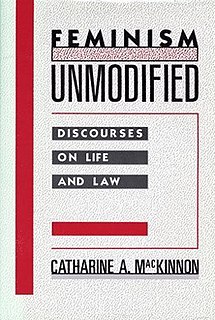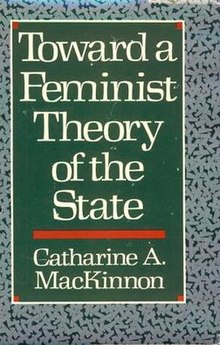Feminism is a range of socio-political movements and ideologies that aim to define and establish the political, economic, personal, and social equality of the sexes. Feminism incorporates the position that society prioritizes the male point of view and that women are treated unjustly in these societies. Efforts to change this include fighting against gender stereotypes and establishing educational, professional, and interpersonal opportunities and outcomes for women that are equal to those for men.
Radical feminism is a perspective within feminism that calls for a radical re-ordering of society in which male supremacy is eliminated in all social and economic contexts, while recognizing that women's experiences are also affected by other social divisions such as in race, class, and sexual orientation. The ideology and movement emerged in the 1960s.

Martha Craven Nussbaum is an American philosopher and the current Ernst Freund Distinguished Service Professor of Law and Ethics at the University of Chicago, where she is jointly appointed in the law school and the philosophy department. She has a particular interest in ancient Greek and Roman philosophy, political philosophy, existentialism, feminism, and ethics, including animal rights. She also holds associate appointments in classics, divinity, and political science, is a member of the Committee on Southern Asian Studies, and a board member of the Human Rights Program. She previously taught at Harvard and Brown.
Liberal feminism, also called mainstream feminism, is a main branch of feminism defined by its focus on achieving gender equality through political and legal reform within the framework of liberal democracy. As the oldest of the "Big Three" schools of feminist thought, liberal feminism has its roots in 19th century first-wave feminism that focused particularly on women's suffrage and access to education, and that was associated with 19th century liberalism and progressivism. Liberal feminism "works within the structure of mainstream society to integrate women into that structure." Liberal feminism places great emphasis on the public world, especially laws, political institutions, education and working life, and considers the denial of equal legal and political rights as the main obstacle to equality. As such liberal feminists have worked to bring women into the political mainstream. Liberal feminism is inclusive and socially progressive, while broadly supporting existing institutions of power in liberal democratic societies, and is associated with centrism and reformism. Liberal feminism "tends to be adopted by 'mainstream' women who do not disagree with the current social structure;" Zhang and Rios found that liberal feminism with its focus on equality is viewed as the dominant and "default" form of feminism. Liberal feminism actively supports men's involvement in feminism and both women and men have always been active participants in the movement; progressive men had an important role alongside women in the struggle for equal political rights since the movement was launched in the 19th century.
Sex-positive feminism, also known as pro-sex feminism, sex-radical feminism, or sexually liberal feminism, is a feminist movement centering on the idea that sexual freedom is an essential component of women's freedom.

Catharine Alice MacKinnon is an American radical feminist legal scholar, activist, and author. She is the Elizabeth A. Long Professor of Law at the University of Michigan Law School, where she has been tenured since 1990, and the James Barr Ames Visiting Professor of Law at Harvard Law School. From 2008 to 2012, she was the special gender adviser to the Prosecutor of the International Criminal Court.
Feminist theory is the extension of feminism into theoretical, fictional, or philosophical discourse. It aims to understand the nature of gender inequality. It examines women's and men's social roles, experiences, interests, chores, and feminist politics in a variety of fields, such as anthropology and sociology, communication, media studies, psychoanalysis, political theory, home economics, literature, education, and philosophy.
Feminist legal theory, also known as feminist jurisprudence, is based on the belief that the law has been fundamental in women's historical subordination. Feminist jurisprudence the philosophy of law is based on the political, economic, and social inequality of the sexes and feminist legal theory is the encompassment of law and theory connected.The project of feminist legal theory is twofold. First, feminist jurisprudence seeks to explain ways in which the law played a role in women's former subordinate status. Feminist legal theory was directly created to recognize and combat the legal system built primarily by the and for male intentions, often forgetting important components and experiences women and marginalized communities face. The law perpetuates a male valued system at the expense of female values. Through making sure all people have access to participate in legal systems as professionals to combating cases in constitutional and discriminatory law, feminist legal theory is utilized for it all.
Susan Moller Okin was a liberal feminist political philosopher and author.
The feminist sex wars, also known as the lesbian sex wars, or simply the sex wars or porn wars, are terms used to refer to collective debates amongst feminists regarding a number of issues broadly relating to sexuality and sexual activity. Differences of opinion on matters of sexuality deeply polarized the feminist movement, particularly leading feminist thinkers, in the late 1970s and early 1980s and continue to influence debate amongst feminists to this day.
Feminism is a broad term given to works of those scholars who have sought to bring gender concerns into the academic study of international politics and who have used feminist theory and sometimes queer theory to better understand global politics and international relations..

Andrea Rita Dworkin was an American radical feminist writer and activist best known for her analysis of pornography. Her feminist writings, beginning in 1974, span 30 years. They are found in a dozen solo works: nine books of non-fiction, two novels, and a collection of short stories. Another three volumes were co-written or co-edited with US Constitutional law professor and feminist activist, Catharine A. MacKinnon.

There exists a diversity of feminist views on prostitution. Many of these positions can be loosely arranged into an overarching standpoint that is generally either critical or supportive of prostitution and sex work. The discourse surrounding prostitution is often discussed assuming sex workers are women, but those in the field of sex work and prostitution are not always women.
Feminist views on pornography range from condemnation of all of it as a form of violence against women, to an embracing of some forms as a medium of feminist expression. This debate reflects larger concerns surrounding feminist views on sexuality, and is closely related to those on prostitution, on BDSM, and other issues. Pornography has been one of the most divisive issues in feminism, particularly in anglophone (English-speaking) countries. This deep division was exemplified in the feminist sex wars of the 1980s, which pitted anti-pornography activists against pro-pornography ones.
Feminism has affected culture in many ways, and has famously been theorized in relation to culture by Angela McRobbie, Laura Mulvey and others. Timothy Laurie and Jessica Kean have argued that "one of [feminism's] most important innovations has been to seriously examine the ways women receive popular culture, given that so much pop culture is made by and for men." This is reflected in a variety of forms, including literature, music, film and other screen cultures.
Feminist political theory is an area of philosophy that focuses on understanding and critiquing the way political philosophy is usually construed and on articulating how political theory might be reconstructed in a way that advances feminist concerns. Feminist political theory combines aspects of both feminist theory and political theory in order to take a feminist approach to traditional questions within political philosophy.

Feminism Unmodified: Discourses on Life and Law is a 1987 book by feminist legal scholar Catharine A. MacKinnon. The book is a collection of essays by MacKinnon delivered during the 1980s, in which she makes a radical feminist critique of pornography and liberal feminism.
Feminist views on sexuality widely vary. Many feminists, particularly radical feminists, are highly critical of what they see as sexual objectification and sexual exploitation in the media and society. Radical feminists are often opposed to the sex industry, including opposition to prostitution and pornography. Other feminists define themselves as sex-positive feminists and believe that a wide variety of expressions of female sexuality can be empowering to women when they are freely chosen. Some feminists support efforts to reform the sex industry to become less sexist, such as the feminist pornography movement.

Feminist interventions in the philosophy of law concern the examination and reformulation of traditional legal systems in order to better reflect the political, social, and economic concerns of women---which also includes various other minority and ethnic groups. Though it draws heavily from feminist legal theory, feminist interventions in the philosophy of law differs from the more common feminist jurisprudence as it also seeks to explain the justification that a government has in interfering with the lives of its citizenry. Accordingly, then, feminist interventions in legal philosophy specifically addresses the relationship and rationale between a judicial system's exercise of power and its effects on female citizens. While particular views vary greatly, most feminist interventions in the philosophy of law operate under a belief that many contemporary legal systems are predicated on patriarchal notions of masculinity that result in a system of deeply-rooted bias and inequality.

Feminist perspectives on sex markets vary widely, depending on the type of feminism being applied. The sex market is defined as the system of supply and demand which is generated by the existence of sex work as a commodity. The sex market can further be segregated into the direct sex market, which mainly applies to prostitution, and the indirect sex market, which applies to sexual businesses which provide services such as lap dancing. The final component of the sex market lies in the production and selling of pornography. With the distinctions between feminist perspectives, there are many documented instances from feminist authors of both explicit and implied feminist standpoints that provide coverage on the sex market in regards to both "autonomous" and "non-autonomous" sex trades. The quotations are added since some feminist ideology believe the commodification of women's bodies is never autonomous and therefore subversive or misleading by terminology.







